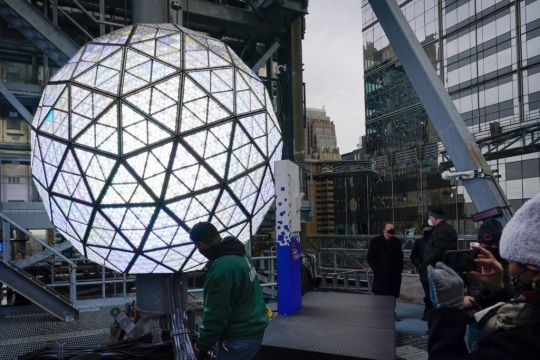New York City police turned to familiar tactics ahead of Thursday’s New Year’s Eve celebrations, deploying bomb-sniffing dogs and sand-filled sanitation trucks intended to guard against explosions.
But the department’s playbook this year includes an unusual mandate: preventing crowds of any size from gathering in Times Square.
Citing concerns over the spread of Covid-19, police closed the Crossroads of the World to vehicles and pedestrians at midnight and said they would disperse any onlookers venturing into a so-called “frozen zone” – the blocks surrounding the ball that historically draw shoulder-to-shoulder crowds.

The coronavirus has upended public life for months, and New Year’s Eve will be no different. This year, police said, revellers headed to Times Square will not be permitted past police lines.
“If you think you’re going to be able to stand there and watch the ball, you’re mistaken,” Chief of Department Terence Monahan said, referring to the glittering, crystal ball that descends down a flagpole in Times Square each New Year’s Eve to mark the stroke of midnight.
Still, Mayor Bill de Blasio vowed, “It’s going to be a joyous night, if ever there was one. Goodbye, 2020. Here comes something better: 2021.”
The NYPD announced a two-part freeze that will become more expansive at 3pm local time. Even guests at five hotels in the area have been told to stay inside.
Juanita Holmes, chief of patrol for the NYPD, urged would-be partygoers to ring in 2021 “from the comfort of your home.”
“Coming to Times Square is a family tradition for some. It is a bucket list item for others. But this year is different,” she said. “I can’t emphasize enough how important it is for everyone to stay home.”
The Police Department will still roll out heavy weapons teams, explosive-sniffing dogs, drones and sand trucks. But it has planned a drastically scaled-back presence in Times Square, including an 80% reduction in its typical workforce assigned to the area.

“We always have to prepare for the worst in terms of counterterrorism overlays,” Police Commissioner Dermot Shea said, “but the crowds will not be like they were in other years.”
This year’s celebration will unfold without the usual throngs of cheering, kissing revellers. Indeed, the event’s special guests, first responders and essential workers, were expected to watch the festivities from a private, well-spaced area.
“It’s almost like a Seinfeld episode,” Mr Shea said, invoking the 1990s “show about nothing.”
“This is a ball drop about nothing, where you can’t see,” he said, “so you may as well stay home.”







